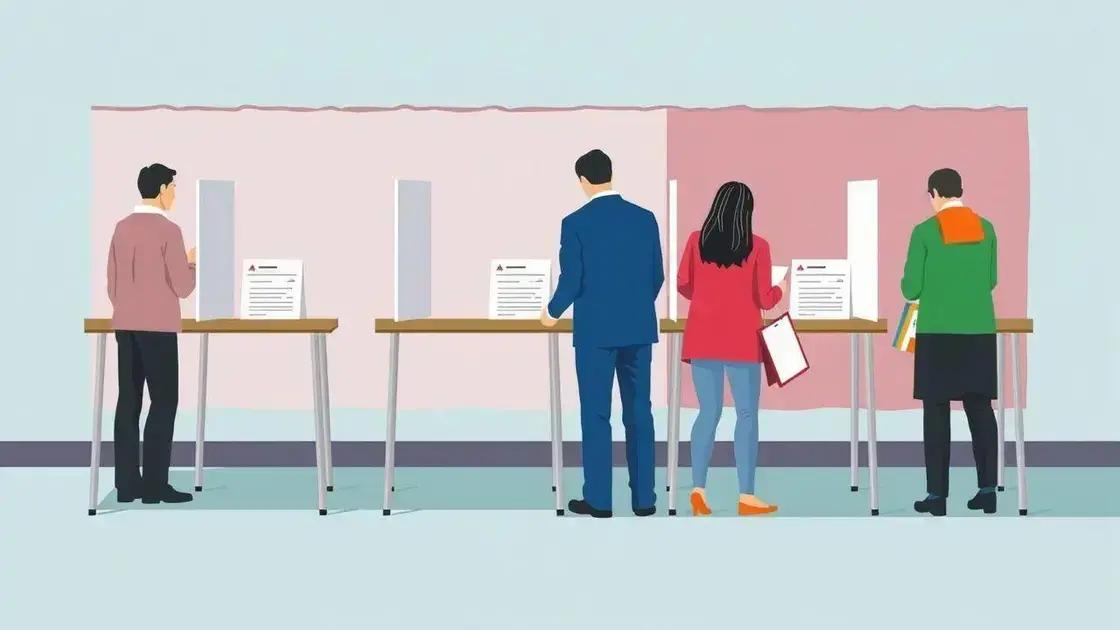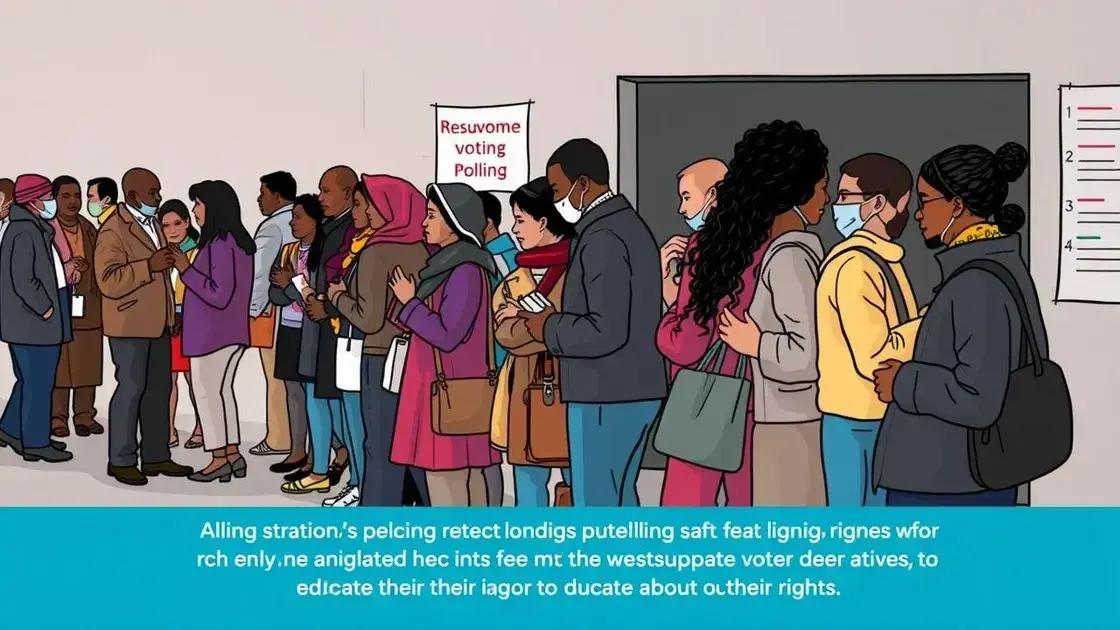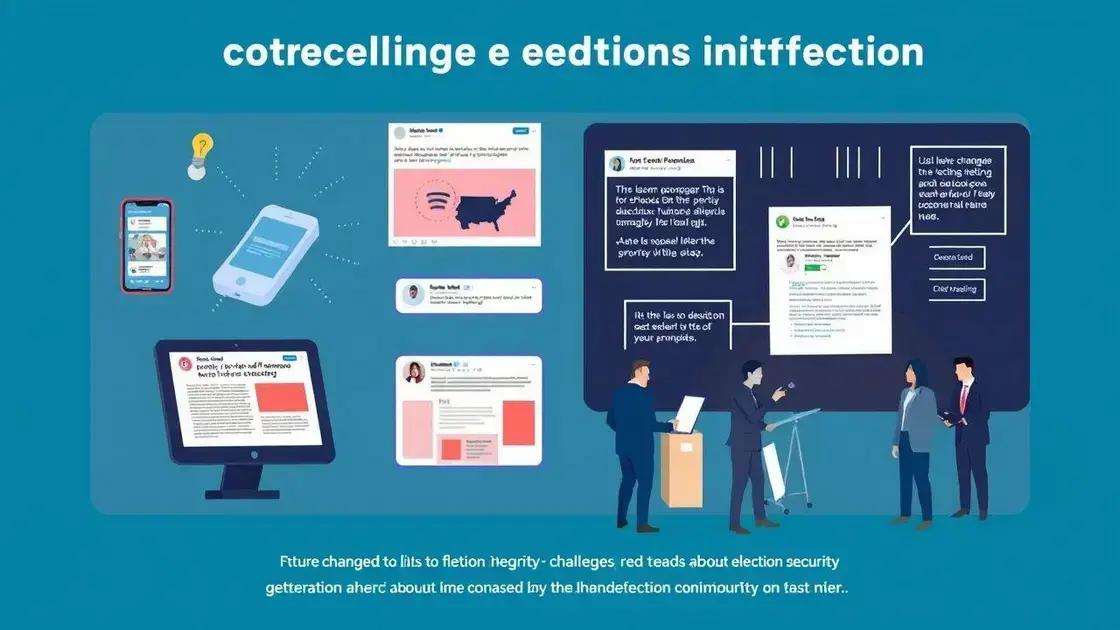Election integrity concerns: what you need to know

Anúncios
Election integrity concerns involve safeguarding the electoral process from issues like misinformation, technological vulnerabilities, and voter suppression, ensuring fair and transparent elections that reflect the public’s will.
Election integrity concerns are at the forefront of political discussions today. With increasing scrutiny on electoral processes, many wonder how these concerns impact democratic engagement and trust in government. Let’s dive into the complexities surrounding this topic.
Understanding election integrity
Understanding election integrity is crucial for maintaining a fair democratic process. It refers to the trustworthiness of elections, ensuring that they are conducted according to established laws and regulations. Various factors play roles in ensuring election integrity, affecting how results are perceived by the public.
Anúncios
Key Components of Election Integrity
Election integrity encompasses several components that help guarantee fairness. These can fundamentally affect the democratic process:
- Voter Registration: Accurate and accessible voter registration is essential. It helps ensure that only eligible voters can participate.
- Ballot Security: Secure ballots protect against tampering and fraud, reinforcing public confidence.
- Transparency in Counting: Clear processes for counting votes enhance trust. Observers and technology can play vital roles.
- Post-Election Audits: Regular audits of election results verify accuracy and help identify discrepancies, ensuring accountability.
Moreover, international perspectives on election integrity offer valuable insights. Many countries have faced challenges that jeopardized election credibility. As such, lessons learned from their experiences can guide improvements in other nations. For example, some nations have implemented advanced technology to monitor and validate elections, increasing reliability.
Challenges to Ensure Election Integrity
Despite advancements, challenges persist. Misinformation can create doubts about election outcomes, leading to unrest. Additionally, restricted access to voting affects participation rates, which in turn influences perceived legitimacy. Engaging all citizens in these processes is pivotal in order to nurture trust.
Anúncios
Overall, understanding election integrity involves recognizing the methods and challenges of conducting elections fairly. Only through continuous efforts to improve election methods can we safeguard democracy and encourage civic engagement.
Historical examples of election integrity issues

Historical examples of election integrity issues provide important lessons for today’s electoral processes. Understanding these events helps us recognize the importance of ensuring fair elections. From infamous cases of fraud to controversial voting laws, history is rich with instances that highlight the need for vigilance.
Notable Cases of Election Fraud
One prominent example is the 2016 U.S. Presidential Election, where allegations of foreign interference raised serious concerns about election security. Similarly, the Florida gubernatorial election in 2000 is remembered for voting irregularities that led to prolonged disputes and confusion.
- 2000 Florida Election: Issues with ballot design and counting methods led to the famous Supreme Court decision that ultimately decided the presidency.
- Chicago’s 1960 Election: Allegations of dead voterscasting ballots have tainted the reputation of this iconic election.
- Kenya’s 2007 Election: Post-election violence erupted following disputed results, highlighting the need for transparency in vote counting.
Throughout history, voter suppression has also posed a significant threat to election integrity. One striking example occurred during the Jim Crow era in the Southern United States, where laws were implemented to disenfranchise African American voters. Tactics such as literacy tests and poll taxes were used to systematically exclude large segments of the population from participating in elections.
The Importance of Lessons Learned
These historical examples of election integrity issues show that without transparency and accountability, public trust in the electoral process can falter. As technology and social media evolve, new challenges arise, requiring ongoing vigilance and adaptation in election practices to uphold democracy.
How technology impacts election integrity
Technology plays a significant role in shaping election integrity today. With advancements in voting systems, technology has the potential to enhance transparency and security. However, these changes also introduce new challenges that must be addressed.
The Role of Voting Technology
Electronic voting machines and online voter registration have made it easier for people to cast their ballots. These innovations help streamline the voting process, making elections more efficient. Yet, reliability and security remain major concerns. Vulnerabilities in voting systems can be exploited, undermining the confidence of voters.
- Electronic Voting Machines: These machines reduce errors in ballot counting but can be susceptible to hacking.
- Online Registration: While accessible, it raises issues of cybersecurity and the potential for identity theft.
- Blockchain Technology: Some propose blockchain as a secure way to record and verify votes, but it remains largely untested in real elections.
Furthermore, social media has transformed how information about elections is shared. While it can raise awareness and engage voters, misinformation and disinformation campaigns pose substantial threats. False narratives can spread rapidly, influencing public perception and trust.
Challenges of Technological Integration
Integrating new technologies into the electoral process is complex. Many states face difficulties in training poll workers and ensuring that all voters can access these systems. It is essential to create inclusive solutions that accommodate diverse populations. Additionally, the digital divide can affect voter turnout, as not everyone has equal access to technology.
Ultimately, navigating the intersection of technology and election integrity requires careful consideration. By addressing the challenges and leveraging benefits, we can work towards a more secure democratic process.
Voter suppression and its effects

Voter suppression is a serious issue that affects election integrity and democracy as a whole. When certain groups of people are systematically denied the right to vote, it undermines the electoral system and erodes public trust.
Understanding Voter Suppression
Voter suppression tactics can take many forms. Some are direct, such as implementing strict voter ID laws that disproportionately affect minority groups. Others may be more subtle, like reducing polling locations in certain neighborhoods, leading to long lines and accessibility issues during elections.
- Strict Voter ID Laws: While aimed at preventing fraud, these laws can disenfranchise eligible voters who may lack proper identification.
- Polling Place Closures: Reducing the number of places where people can vote can create barriers, particularly for low-income individuals who may struggle to travel to distant sites.
- Limited Voting Hours: Shortened hours can make it difficult for working individuals to cast their ballots, leading to lower participation rates.
Moreover, public awareness of voter suppression is vital. Many citizens may not realize that these tactics exist, which means they may become more engaged when they learn about the impacts. Education campaigns can empower voters to advocate for their rights and hold lawmakers accountable.
The Consequences of Voter Suppression
The ramifications of voter suppression are far-reaching. It not only affects electoral outcomes but also shapes public policy. When elected officials are not truly representative of their constituents, the needs of those communities can be overlooked.
Low voter turnout due to suppression tactics can lead to a lack of accountability in government. Additionally, voter suppression can foster feelings of disenfranchisement and distrust among communities, worsening social divisions. Ensuring fair voting practices is crucial for the health of our democracy.
International perspectives on election integrity
International perspectives on election integrity reveal a variety of practices and challenges faced by countries around the world. These differences highlight the importance of adapting lessons learned to enhance the electoral process in different contexts.
Global Approaches to Election Integrity
Countries employ various methods to ensure fair elections. For instance, many European nations utilize robust systems for voter registration and verification. These systems often include comprehensive checks to deter fraud and enhance confidence among voters.
- Germany: The nation uses a transparent voting system where ballots are counted publicly, ensuring accountability in the electoral process.
- Canada: Canada’s Independent Electoral Commission oversees elections, implementing best practices for accessibility and fairness.
- Switzerland: With a unique system of direct democracy, Swiss citizens regularly vote on multiple issues, showcasing the importance of public engagement in governance.
On the other hand, some countries struggle with significant integrity challenges. In many developing nations, issues like corruption and political instability undermine the electoral process. In countries experiencing conflict, the ability to conduct free and fair elections is often compromised.
Lessons from Global Experiences
Looking at international perspectives allows for valuable insights into improving election integrity. For example, ensuring transparency and accountability at every level of the electoral process fosters trust in government. Voter education campaigns can also enhance public awareness about the electoral process, enabling citizens to participate more actively.
Additionally, collaborating with international organizations can provide guidance and assistance in establishing best practices that promote fair elections. By learning from diverse experiences, countries can strengthen their electoral systems and improve overall democratic engagement.
Future challenges in maintaining election integrity

The future of election integrity faces numerous challenges that could impact the fairness of democratic processes. As technology evolves, so do the tactics used to undermine elections, necessitating proactive solutions to safeguard electoral systems.
Emerging Threats
One major challenge is the rise of misinformation. With the expansion of social media, false narratives can spread quickly, influencing public opinion and trust in electoral outcomes. Identifying and combating misinformation has become critical for maintaining integrity.
- Targeted Disinformation Campaigns: These campaigns can manipulate voter perceptions and undermine confidence.
- Deepfakes: The use of AI-generated content can create convincing false narratives about candidates or issues.
- Online Harassment: Candidates and voters alike may face intimidation, deterring them from participating in the electoral process.
Additionally, advancements in technology pose both risks and benefits. While secure voting technologies can enhance election integrity, they also attract cyber threats. Hackers are increasingly targeting electoral systems, aiming to disrupt or manipulate results. Ensuring robust cybersecurity measures is essential to protect these vital systems.
Legal and Policy Implications
In response to these challenges, legislative actions must adapt to changing landscapes. Laws surrounding voter access and election security will need regular updates to minimize vulnerabilities. Striking a balance between security measures and access is vital for equitable participation.
Furthermore, public trust in elections hinges on transparency. Clear communication about voting processes and security measures can help reassure voters. Collaboration between government bodies, tech companies, and civil society organizations is essential to create comprehensive strategies that enhance election integrity.
FAQ – Frequently Asked Questions about Election Integrity
What is election integrity?
Election integrity refers to the trustworthiness of the electoral process, ensuring that elections are fair, transparent, and reflective of the will of the people.
How does misinformation affect elections?
Misinformation can confuse voters, influence public opinion, and undermine trust in electoral outcomes, making it a significant threat to election integrity.
What technological risks are associated with voting systems?
Voting systems face cybersecurity threats, including hacking attempts and vulnerabilities that can jeopardize the accuracy and security of elections.
Why is collaboration important for maintaining election integrity?
Collaboration among governments, technology providers, and civil society is crucial for creating effective strategies and policies that enhance transparency and public trust.







